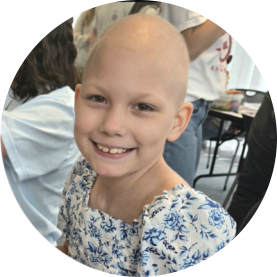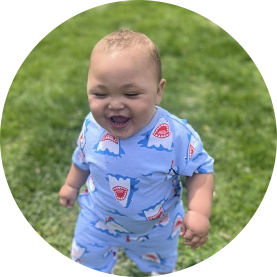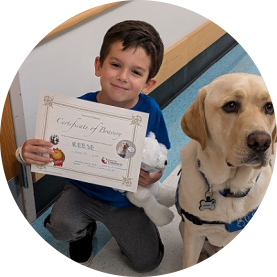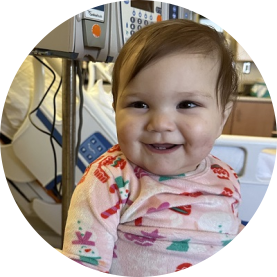- Acute Lymphoblastic Leukemia (ALL)
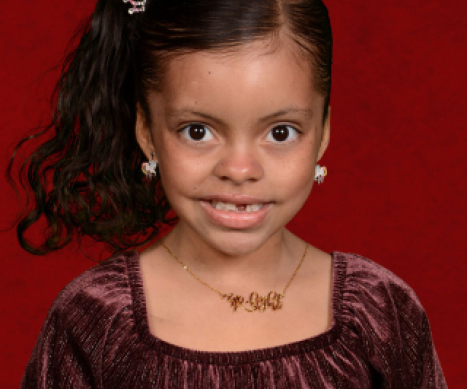

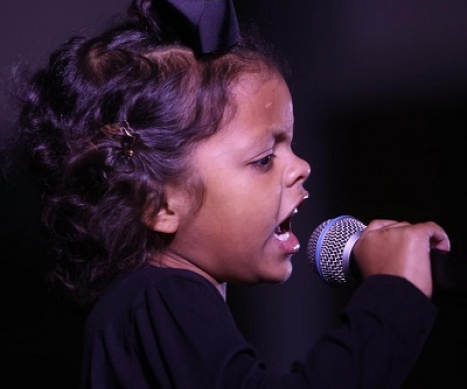

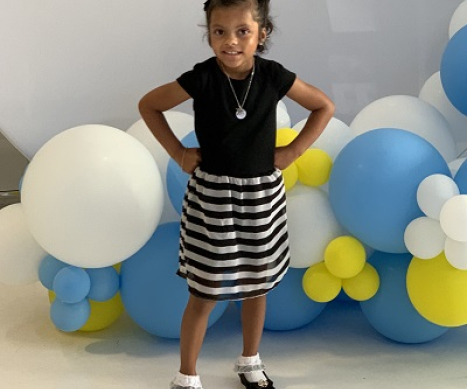
Click the images to see them larger above!
Learn more about
Acute Lymphoblastic Leukemia (ALL)
Get the facts about Acute Lymphoblastic Leukemia (ALL) and how our research projects are making a difference.
Learn More »Eight-year-old Ailani has the sweetest spirit and personality. She’s kind and loving, but is also a firecracker with a leader mentality. She makes all kinds of friends and likes to sing, dance, and play with her favorite baby dolls, princesses, and stuffed animals all day. Her family calls her a true Warrior Princess, a title she’s earned as she battles acute lymphoblastic leukemia.
On March 2, 2019, while visiting family in Texas, Ailani’s parents noticed a red rash on their daughter’s belly as well as her scalp. She didn’t appear to be ill otherwise, she had no fevers, and she was playing and eating as she normally did. They took her to urgent care to check out the rash just in case. While there, they were told it was petechia and that Ailani was fine. If they wanted to have blood work done, they had to take her to the ER.
They went straight there. According to her blood work, Ailani needed platelets right away. She was then transferred to Baylor Scott and White Children’s Hospital 45 minutes away. Later that evening, Ailani’s parents were told their sweet daughter had leukemia.
Ailani immediately began the standard treatment protocol for leukemia. Four weeks following her diagnosis, doctors discovered that her leukemia was in fact not standard, but a rare form with a genetic mutation called MLL-r or KMT2A. This changed her diagnosis status to very high-risk with a poor prognosis.
In May of 2019, 10 days after learning of the KMT2A mutation, Ailani’s family relocated to Baltimore and began treatment at Johns Hopkins. The prevailing recommendation was a bone marrow transplant and on July 3, 2019 Ailani received a haplo-identical bone marrow transplant from her dad. Ailani and her family then lived in the Ronald McDonald House in Baltimore for seven months until it was safe for her to live further away from the hospital.
At the end of June 2020, just three days before Ailani’s one-year transplant anniversary, she relapsed.
Ailani immediately began bridging therapy in preparation for CAR T cell therapy. Then in July 2020, she contracted a fusarium fungal infection in her knee from a tiny scrape. Within days, the fungal infection had spread throughout her entire body. She had surgery on her knee, had a wound vacuum for a couple of weeks, and had a few fungal lesions removed from the back of her head, leg, and arm. She was incredibly sick and in tremendous pain. Her family feared they wouldn’t get to bring her out of the hospital alive.
Once her neutrophils returned and she received four granulocyte transfusions, Ailani finally started to improve and was able to receive her CAR T cells on August 24. She was able to enjoy a wonderful remission for nine months.
Unfortunately, in May 2021, Ailani relapsed again. She started 24/7 infusion of immunotherapy the next month, as a bridge for her second transplant. In July, her family left Maryland for California so Ailani could participate in a bone marrow transplant clinical trial at Stanford Children’s Hospital. Then in August, Ailani received a clinical trial haplo-identical stem cell transplant with her mom as the donor. She had many complications afterwards and unfortunately relapsed again just two months post-transplant.
In January 2022, Ailani was enrolled into Seattle Children’s bi-specific CAR T cell therapy clinical trial. But due to an FDA pause, Ailani had to wait a few months to receive her CAR T cells. Finally, in March, Ailani received her therapy, which resulted in some major neurotoxicity that landed her in the PICU for a few days. Fortunately, the neurotoxicity only lasted about a week. Sadly though, the CAR T cells only lasted 2 months before they wore off and Ailani relapsed again. In June, she was enrolled in another clinical trial for a menin inhibitor. Unfortunately, the trial medication did not respond.
Read more of Ailani's story on The Childhood Cancer Blog
At the end of September, Ailani’s family began their search for another clinical trial with a way to stop her leukemia from growing. On April 18 2023, the day after Ailani's 7th birthday, she began a trial at Children's Hospital of Philadelphia. A bone marrow biopsy showed no evidence of disease. She was able to enjoy her summer in remission, started second grade at school (in person for the first time!). Then in March 2024, Ailani relapsed for the seventh time. She began another type of CAR T clinical trial.
The treatment didn’t seem to work at first; but a bone marrow biopsy six months later showed her disease burden dropping. Now, Ailani is waiting for her next biopsy in December 2024.
“She is the bravest, most courageous and caring child I’ve ever met in my life,” said Ailani’s mom, Princecine. “She doesn’t complain about the unfairness of this journey. She just does what she has to do.”
Princecine also extends her understanding heart to other families who may be facing a diagnosis. She knows this is not easy, and although you may lose friends or family along the way, you will gain new friends and family who will understand all your fears and anxieties. Take it one day at a time, one breath at a time, and allow others to help you. Her hope is what every childhood cancer family wants – for their child to be cured, happy, and healthy with no life-threatening side effects.
While Ailani is happy and feels healthy and normal, her family is making the most out of this wonderful but temporary time. They are comforted knowing that foundations like Alex’s Lemonade Stand Foundation (ALSF) are working hard to make more clinical trials available. To them, ALSF means hope for the future that one day childhood cancer will be a thing of the past.
“We do what we have to do!” - Ailani
Information provided by Princecine J., Ailani’s mom
Updated November 2024
Donate in Honor of Ailani Today!
Your donation helps to fund critically-needed research to find better treatments and cures for children with cancer.


